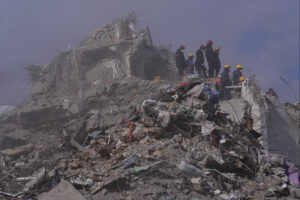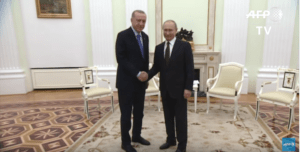Democrats and Neocons Are the Biggest Losers of Trump’s Syria Withdrawal
The president has radically redrawn the Middle East with a single tweet. Here's who stands to benefit from his decision—and who does not. Former Secretary of State Hillary Clinton. (Gage Skidmore / Flickr)
Former Secretary of State Hillary Clinton. (Gage Skidmore / Flickr)
When power is balanced as delicately as it is in the Middle East, minor changes can have major consequences. So while 2,000 troops may not sound like much, Donald Trump’s decision to withdraw them from eastern Syria has generated a rich list of winners and losers. Here’s a rundown:
Winners
Russia: Nancy Pelosi’s Dec. 20 description of the pullout as “a Christmas present to Vladimir Putin” is not off the mark. Not only has the Russian president gained leverage in Syria, he’s now the chief arbiter across the entire Mashriq, the area from the Nile to the Tigris. But the pullout alters the balance of power in another arena as well: the Black Sea. The Nov. 26 fracas in the Kerch Strait, in which Russia captured three Ukrainian navy boats attempting to force their way through what Moscow regards as its territorial waters, ended in a clear Russian victory, because it showed that it could limit access to the Sea of Azov (and therefore to the Ukrainian ports of Mariupol and Berdyansk) without NATO able to do much in response.
It’s a far cry from the heady days of February 2014, when the U.S. thought it could use the “AutoMaidan” protests in Kiev to force Russia out of its historic naval base at Sevastopol in the southern Crimea, a move that, if successful, would have virtually closed off Russian access to the Black Sea. But now the shoe is on the other foot. If the Syria pullout is a sign that the American appetite for foreign adventures is on the wane, Russia will gain even more room to maneuver—not only in Syria but in the Black Sea as well.
Iran: The last time Iran opened a corridor from the Persian Gulf to the Mediterranean was in the early seventh century, when it overran Syria and captured Jerusalem. Then the Byzantines counterattacked in 628, and the Arab conquests began in 632. With the U.S. out of Syria, the path is once again open from Iraq to Lebanon. It’s a victory of historic proportions.
Turkey: Reportedly, Trump’s decision to withdraw from Syria was born of a Dec. 14 phone call with Recep Tayyip Erdogan. “OK, it’s all yours,” the American president said. “We are done.”
While the Turkish president can’t be very happy to see his old enemy, Bashar Assad, return to power in Syria, an end to U.S. support for Kurdish separatists is a Christmas present in its own right.
Syria: In August 2011, Barack Obama called on Assad “to step aside” while Secretary of State Clinton entered into talks with Saudi Arabia and other “friends of Syria” about launching an armed Sunni invasion. But with Obama writing his memoirs and Clinton still nursing her wounds from 2016, the British-trained ophthalmologist can finally set about reunifying his country.
As heir to a 30-year family dictatorship, Assad was arguably little more than a Levantine Michael Corleone when he took office in July 2000. After withstanding a brutal seven-year assault by U.S.- and Saudi-backed mujahedeen, however, he’s emerged as a hero of the Third World masses.
Losers
Democrats and neoconservatives: Rarely has a strategy backfired as roundly as the Dem-neocon approach has since 2011. In Libya, Clinton spent weeks persuading Qatar to join the anti-Gadhafi coalition, only to stand by and watch as the gas-rich sheikdom massively funded Islamist militias spreading anarchy from one end of the country to the other. Decades of social progress were erased, slavery was restored and Libya turned into a happy hunting ground for Islamic State and al-Qaida.
In Syria, the U.S. gave Saudi Arabia, Qatar and other oil monarchies the green light to flood the country with thousands of Wahhabi head-choppers, unleashing a sectarian war that may have cost upward of half a million lives. In the Ukraine, Assistant Secretary of State Victoria Nuland, a Clinton protégée, encouraged an uprising spearheaded by the ultraright that sent a legally elected president packing and ushered in a regime heavily dependent on neo-Nazi militias. In Yemen, the Obama administration couldn’t say no to a Saudi-United Arab Emirates war of aggression that, after nearly four years, has killed as many as 80,000 people and brought up to 14 million more to the brink of starvation
The results have been every bit as destructive as the shock and awe that George W. Bush unleashed on Iraq in 2003. White House Chief of Staff Mick Mulvaney may have exaggerated when he said that Syrian withdrawal is “very popular with ordinary American people,” but not by much. Certainly, no one is taking to the streets to keep the troops in place. Democrats have suffered a major rebuff, deservedly so.
Israel: The Jewish state had counted on U.S.- and Saudi-backed rebels to bring down Assad, even providing medical treatment to wounded al-Qaida fighters and all but formally backing an Islamic State. “If we have to choose between [Islamic State] and Assad, we’ll take [Islamic State],” former Israeli Ambassador to the U.S. Michael Oren explained. Israeli Minister of Defense Moshe Ya’alon echoed the sentiment, claiming: “[I]f the choice is between Iran and the Islamic State, I choose the Islamic State.”
The result, to quote Talleyrand, is worse than a crime—it’s a blunder. U.S.-backed jihadis were always fighting an uphill battle. The more they tried to thrust Syria back into the Middle Ages, the more Christians, Shiites, Druze and women united behind the Assad government, which, despite its sins, is at least pluralist and secular. But now that Damascus has emerged victorious, the upshot is that Israel faces a battle-hardened Syrian army across its northern frontier, along with Hezbollah, Iran’s Islamic Revolutionary Guard and a sophisticated Russian air-defense system.
As for Israel’s two main allies, both are in disarray: Saudi Arabia remains on the ropes following the murder of Washington Post columnist Jamal Khashoggi and plunging oil prices (off 45 percent since early October), while the U.S. grapples with market instability and a wildly unpopular president. Israel is in its worst strategic position since the eve of the Six-Day War in 1967.
Saudi Arabia: The kingdom can’t be very happy now that archenemy Iran’s influence is expanding, while Crown Prince Mohammed bin Salman is persona non grata across the globe, thanks to his role in the Khashoggi killing. Collapsing oil prices, along with capital flight and deepening budget woes, have only added to its misery. Trump’s decision to abort Saudi-backed efforts to overthrow Assad shows just how alone and friendless the kingdom has become.
Islamic State and al-Qaida: The war against both groups was a farce under Obama and no less fraudulent under Trump. In Syria, the U.S. allowed Islamic State to fester and grow in the hope of using it as leverage against Assad. As John Kerry, Clinton’s successor as secretary of state, put it in September 2016: “We saw that Daesh [i.e., Islamic State] was growing in strength, and we thought Assad was threatened. We thought, however, we could probably manage, that Assad might then negotiate. Instead of negotiating, he got … Putin in to support him.” According to a December 2017 study by Conflict Armament Research, a London research group funded by Switzerland and the European Union, the U.S. and Saudi Arabia provided Islamic State with much of its arms and material support. Obama refused to bomb Islamic State oil fields in eastern Syria, a major revenue source, until Russia’s entry into the war finally forced his hand.
Trump, for his part, allowed a column of heavily armed Islamic State fighters, some 4,000 in all, including family members, to flee the pulverized city of Raqqa in October 2017 under circumstances that still haven’t been fully explained. Although U.S. warplanes supposedly monitor the area around its military outpost at al-Tanf in southern Syria, they did nothing to stop hundreds of Islamic State fighters from crossing in July on their way to the Druze province of Sweida some 70 miles to the west, where they killed at least 256 people and kidnapped dozens more. The U.S. says it has been unable to dismantle an Islamic State stronghold in the eastern province of Deir al-Zour because Islamic State has taken advantage of at least two sandstorms to launch major counterattacks. Sandstorms in the Syrian Desert? How could the military have known?
Now that such nonsense is drawing to a close, the one force with a clear and unambiguous reason to battle Islamic State and al-Qaida—i.e., the Syrian army, backed by Russia, Iran and Hezbollah—is finally taking the field without U.S. obstruction.
The Kurds: These are the most tragic losers of all, because they had counted on the U.S. to help carve out a homeland in northeastern Syria. While U.S. critic Noam Chomsky has called for their military protection to continue, arguing that they shouldn’t be “subjected to an attack by their bitter enemies the Turks, or by the murderous Assad regime,” such action would only further place the Kurds at the mercy of an erratic Trump administration. Their only hope is to reach an accord with Assad, and the sooner the better. If he’s smart, he’ll meet them at least halfway. (Editor’s note: The Kurds reached out to the Syrian government on Friday for protection from a possible Turkish attack.)
Wild Cards
Russian-Israeli rapprochement: Now that the U.S. is pulling out, Israel may have no choice but to attempt to reach an accord with Putin, the Middle East’s new kingmaker. It’s not so far-fetched. One Israeli in seven is of Russian extraction, and perhaps the only monument to the Red Army’s victory in World War II outside the old Soviet bloc lies in the Israeli seaside town of Netanya. Soviet-born Avigdor Lieberman, until recently Israel’s minister of defense, seems especially pro-Moscow.
As tough ethnarchs, Putin and Benjamin Netanyahu have much in common. Russia, meanwhile, would like access to Israeli technology, while Israel would like Russia to restrain Hezbollah, Syria and Iran. Hence, a Nixon-to-China moment is not out of the question.
An al-Qaida resurgence: This is not the first time al-Qaida has been down and out. During the Anbar Awakening of 2008, a U.S.-backed upsurge by Sunni tribal leaders drove it out of Iraq. While in Afghanistan, Taliban and al-Qaida leaders both lived in constant dread of Predator missiles. But then conditions shifted, and the group emerged stronger than ever.
The question now is whether another resurgence is in the works in Afghanistan, where the Taliban continue to advance; in northern Iraq, where Islamic State appears to be regrouping; and even in Saudi Arabia, where the country continues to destabilize under a vicious and isolated crown prince.
War with Iran: Open hostilities with the Islamic republic are the ultimate wild card. It may seem unlikely, given how much all sides stand to lose—not only Iran, but the U.S., Saudi Arabia and Israel, too. But its irrationality probably makes it a more rather than a less likely scenario.
Your support matters…Independent journalism is under threat and overshadowed by heavily funded mainstream media.
You can help level the playing field. Become a member.
Your tax-deductible contribution keeps us digging beneath the headlines to give you thought-provoking, investigative reporting and analysis that unearths what's really happening- without compromise.
Give today to support our courageous, independent journalists.





You need to be a supporter to comment.
There are currently no responses to this article.
Be the first to respond.